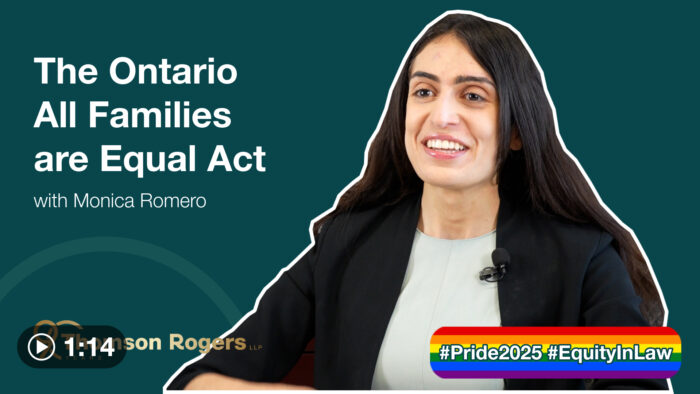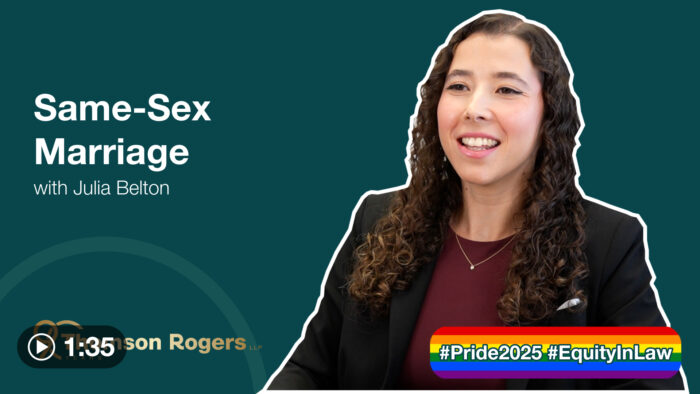The Role of the Litigation Guardian
May 1, 2009
By: Jill K. Van Vugt
Ontario’s legal system contains many safeguards to protect the rights of children and mentally incapable persons who start a lawsuit.
In legal terms, a person under the age of 18, or an adult who lacks the mental capacity to make certain decisions, is a “party under disability”. Persons under disability must be represented by a Litigation Guardian before commencing an action for damages. A Litigation Guardian is someone over the age of 18 who has authority to instruct counsel throughout the litigation. The Litigation Guardian is presumed to make decisions in the best interests of the person under disability.
Before you agree to be a Litigation Guardian, you should be aware of the particular rights and responsibilities you will assume for the benefit of the person under disability. The comments and opinions expressed below refer only to the requirements of Litigation Guardians for plaintiffs, or those who start a lawsuit against one or more persons or corporations. Different rules apply when a minor or mentally incapable person is named as a defendant in a lawsuit.
A Litigation Guardian is the legal representative of the person under disability and is required to make a wide range of decisions that will impact the outcome of the person’s lawsuit. According to the Rules of Civil Procedure, the litigation guardian “shall diligently attend to the interests of the person under disability and take all steps necessary for the protection of those interests.” Examples of such steps include: retaining a lawyer; pursuing all claims and avenues of compensation; accepting or rejecting the advice of counsel and providing instructions to counsel on the general conduct of the litigation. Perhaps the most important instructions the Litigation Guardian will give to a lawyer involve whether to settle or discontinue the case. The Court’s scrutiny over some of these decisions will be discussed below.
The law of Ontario stipulates that a person under disability may not start a lawsuit unless he is represented by a Litigation Guardian. There is no requirement that the Litigation Guardian be a relative or spouse of the person under disability, although this is usually the case. If no one is willing and able to act as Litigation Guardian, the Court may appoint the Children’s Lawyer or the Public Guardian and Trustee. The law further mandates that a person under disability must be represented by a lawyer.
The proposed Litigation Guardian must swear an Affidavit which is filed at the Court, stating the following:
- s/he consents to act as litigation guardian;
- s/he has given written authority to a named lawyer to act in the lawsuit;
- a statement providing details of the party’s disability (i.e.: either a minor under the age of 18 or reasons why a party is mentally incapable)
- in the case of a minor, the minor’s birth date;
- whether the proposed litigation guardian and party under disability are residents of Ontario;
- details of the relationship between the proposed litigation guardian and party under disability;
- that the proposed litigation guardian has no interest in the lawsuit that may be adverse to the party under disability; and
- that the proposed litigation guardian has been advised of his/her duty to personally pay costs if costs are awarded against the party under disability or against him/ her personally.
Most of these requirements are self evident, however the last two requirements require further explanation.
Adverse in Interest
The legal term “adverse in interest” refers to a number of circumstances in which the Litigation Guardian may be forced to choose between his or her own interests and those of the person under disability. If you are named as a defendant in a lawsuit in which the person under disability is a plaintiff, you are prohibited from acting as the person’s Litigation Guardian. Under these circumstances, a Litigation Guardian cannot be presumed to act in the best interests of the person under disability. This is because any advantage gained by the person under disability is detrimental to the defendants’ case and vice versa – this would place a Litigation Guardian, who is also a defendant, in a conflict of interest.
Costs
People who commence litigation always run the risk that they may be unsuccessful in obtaining a settlement or Judgment against a defendant. In some cases, an unsuccessful plaintiff may be ordered to pay “costs”, or a portion of the successful defendant’s legal bill. A person under a disability is no different except that the person responsible for paying costs is the Litigation Guardian. Almost invariably, a diligent lawyer will advise the Litigation Guardian if prospects for success have diminished to the point where a defendant may be entitled to costs. In this event, the lawyer should advise the Litigation Guardian that if he or she instructs the lawyer to press on with the litigation, the Litigation Guardian may be held accountable to pay a portion of the defendant’s legal bill. In rare cases, the person under disability may be required to pay back the Litigation Guardian for costs incurred on the person’s behalf.
What a Litigation Guardian Is Not
Despite the numerous legal responsibilities and duties imposed on a Litigation Guardian, it is important to differentiate between “Litigation Guardian” and another type of guardian – “Guardian of Property and/or Person”. A Litigation Guardian does not have the authority to dispose of or otherwise manage a person under disability’s property. Likewise, a Litigation Guardian cannot make decisions affecting the person under disability’s health and well-being simply by being a Litigation Guardian. In fact, the term “Litigation Guardian” adequately prescribes the Litigation Guardian’s scope of authority to issues arising from the litigation. To become a Guardian of Property and/or Person, an individual must make an Application before a Judge under the Substitute Decisions Act, 2002. The Applicant must satisfy rigorous requirements before the Court will grant him or her rights over the property and person of the person under disability.
Directing the Litigation – Settlement and Discontinuance
Perhaps the most important role of the Litigation Guardian is the authority to settle the person under disability’s case. The law in Ontario mandates that all settlements of the claims of persons under disability be reviewed by a Judge. As part of this review process, the Litigation Guardian must swear another Affidavit attesting to the relevant facts of the litigation, the components of the settlement (including payment of lawyers’ fees and the amounts attributed to Family Law Act claims) and the reasons why the Litigation Guardian supports the proposed settlement.
The Court will closely examine the facts underpinning each settlement in Ontario involving a person under disability. The goal of such oversight is to determine whether the settlement is in the best interests of the person under disability. This unique function of the Court illustrates the great lengths taken to protect the interests of children and mentally incapable persons involved in litigation.
The Court also oversees the discontinuance of lawsuits involving persons under disability. In addition to the Court’s oversight, the Children’s Lawyer or Public Guardian may be called upon to comment on the decision to discontinue the person under a disability’s claim. If the Children’s Lawyer or Public Guardian argues that the claim has merit, the Court may refuse the Litigation Guardian’s request to end the lawsuit.
In either the event of settlement or discontinuance, the conduct of a Litigation Guardian throughout the course of litigation will be examined by a Judge. A Litigation Guardian is not held to the standard of perfection, but that of a reasonable person acting in the best interests of the person under disability. Potential Litigation Guardians and the public should take comfort in the fact that many safeguards exist within our legal system to vigorously protect the rights of persons under disability.
Minimum Wage (Level 2 rate) increase from $8.00 to $8.75 began March 31, 2008
Share this






